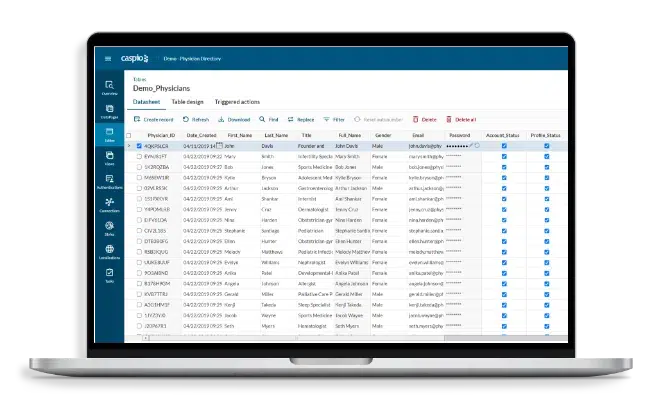Produce Open Platform Databases Conveniently with the very best No-Code Tools Available
Produce Open Platform Databases Conveniently with the very best No-Code Tools Available
Blog Article
Exploring the Benefits of Scalable Data Sources That Call For No Coding Abilities for Reliable Data Management Solutions
The appearance of scalable databases that remove the requirement for coding skills presents a transformative opportunity for companies looking for effective data management solutions. By allowing non-technical customers to harness the power of data through user-friendly user interfaces, these systems enhance ease of access and foster partnership across varied teams. In addition, their cost-effectiveness and adaptability to developing company demands can substantially streamline functional processes. As we take into consideration the ramifications of such developments, it comes to be essential to check out just how they can reshape the landscape of information management and drive sustainable growth in an affordable environment.
Enhanced Access for Individuals
Enhanced accessibility for customers is a crucial element of scalable databases, guaranteeing that data administration systems are easy to use and user-friendly. In a period where data-driven decisions are extremely important, accessibility permits a larger range of individuals, consisting of those without extensive technical know-how, to involve with database systems efficiently. This democratization of data gain access to promotes enhanced cooperation throughout divisions, encouraging workers to remove understandings and make informed decisions.
Easy to use user interfaces, such as aesthetic data and drag-and-drop functions depiction, simplify complex data communications. These enhancements reduce the discovering curve connected with standard data source management, enabling individuals to concentrate on leveraging data as opposed to grappling with technical complexities. Scalable data sources typically incorporate real-time analytics and personalized control panels, providing individuals with prompt insights customized to their specific demands.

Cost-Effectiveness and Resource Financial Savings
Reliable information administration not just depends upon availability yet also on cost-effectiveness and source cost savings. Scalable databases developed for customers without any coding skills substantially lower financial concerns usually related to typical data source administration systems. By removing the need for specialized programming experience, organizations can allocate their resources a lot more efficiently, concentrating funds on core company tasks instead of extensive training or hiring skilled employees.
Furthermore, these databases usually use cloud-based options, which additionally decrease expenses connected to hardware and maintenance. Organizations can scale their data source options according to their demands, avoiding the expenses incurred from over-provisioning sources. This flexibility suggests companies can adjust to transforming needs without incurring unneeded prices, causing significant long-term cost savings.
Furthermore, user-friendly interfaces simplify information entry and management procedures, decreasing the time invested in management tasks. This performance converts into labor expense financial savings, allowing teams to concentrate on calculated campaigns as opposed to routine upkeep. Generally, taking on scalable databases that require no coding skills fosters a more affordable technique to data monitoring, making it possible for companies to maximize their resources while preserving high levels of operational efficiency.
Improved Collaboration Across Teams

Furthermore, scalable databases help with seamless interaction amongst staff member. With easy to use interfaces that need no coding skills, staff members can quickly develop, modify, and share reports or dashboards tailored to their certain demands. This democratization of information encourages non-technical customers to add insights, enhancing the collaborative atmosphere.
Furthermore, these data sources sustain concurrent accessibility, allowing several customers to service the very same dataset at the same time. This attribute enhances productivity, as groups can involve in joint information evaluation without the danger of version control problems. The ability to leave notes or comments straight within the database even more promotes discussion and makes clear information analyses.
Streamlined Data Management Processes
In today's data-driven environment, companies identify the requirement of streamlined data management refines to make best use of performance and precision. By leveraging scalable databases that call for no coding abilities, organizations can streamline their data handling and reduce the intricacies normally connected with conventional database systems. This ease of access equips non-technical users to involve straight with data, promoting quicker decision-making and lowering reliance on specialized IT personnel.
Structured data monitoring processes enhance workflow by automating regular tasks such as information entrance, validation, and coverage. Automated data combination guarantees that details from different resources is aggregated seamlessly, getting rid of silos and fostering a linked view of critical service metrics (no-code). Moreover, user-friendly interfaces permit workers to adjust data conveniently, enabling them to create insights that drive calculated initiatives without the requirement for extensive training.
This effectiveness not only speeds up operational processes but likewise decreases the capacity for human mistake, making certain that data stays exact and reliable. Inevitably, streamlined data management processes with scalable data sources lead to enhanced productivity, enabling companies to concentrate on core tasks while making certain that their information monitoring techniques are efficient and effective.
Scalability for Expanding Companies

For expanding ventures, the capacity to scale up or down is vital. A scalable database can handle an increase of information created from brand-new customers, items, or services, ensuring that business procedures remain nonstop. Additionally, these databases give the ability to manage peak lots effectively, which is important throughout periods of rapid development or seasonal find more spikes.
Furthermore, many scalable data source services are designed with straightforward interfaces that call for no coding skills, equipping non-technical staff to handle information efficiently (no-code). This democratization of data administration permits organizations to allocate resources purposefully and decrease you can try here dependence on specialized IT personnel
Inevitably, adopting a scalable data source not just enhances operational performance but likewise cultivates an environment where services can innovate and progress without the restrictions of traditional database systems. This versatility placements organizations for long-lasting success in today's affordable landscape.
Conclusion
In conclusion, scalable data sources that call for no coding abilities give substantial benefits for effective data management. By streamlining information monitoring procedures and using scalability for growing companies, such services enable companies to adjust to changing needs properly.
Improved ease of access for users is an important element of scalable databases, making certain that information administration systems are straightforward and user-friendly.User-friendly user interfaces, such as aesthetic data and drag-and-drop features depiction, simplify intricate data interactions. Generally, embracing scalable data sources that need no coding skills promotes a more cost-efficient method to data monitoring, allowing companies to maximize their sources while preserving high degrees of operational performance.
By leveraging scalable databases that need no coding skills, organizations can simplify their information handling and reduce the intricacies usually linked with standard database systems - no-code.Structured data administration procedures enhance operations by automating regular tasks such as information entry, validation, and coverage
Report this page